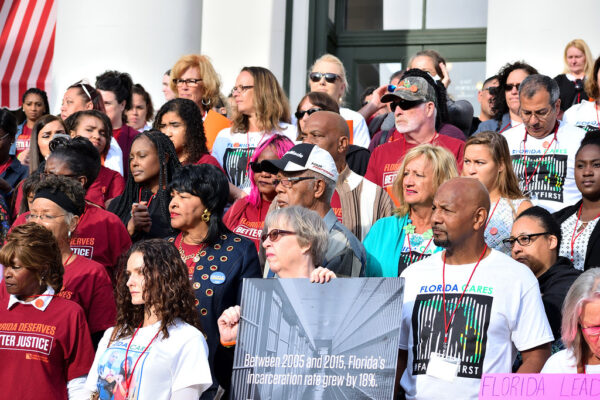This was originally published by Tampa Bay Times.
Florida locks up too many people. Crime is down, yet our state spends more than $2.4 billion each year to incarcerate nearly 100,000 people. Florida locks up too many people of color — who make up 59.4 percent of Florida’s incarcerated population, but only 42.5 percent of our general population. The numbers for black people are even worse — who make up 47 percent of those in prison, but only 16.9 percent of Florida’s population.
Such racial disparities permeate our criminal justice system, from juvenile transfers to adult court to sentence lengths to placement in solitary confinement. Failure to address these glaring disparities while seeking to reform the criminal justice system erodes confidence in the legitimacy of that system.
While more than 30 states and the federal government have passed criminal justice reforms to reduce the prison population, save tax dollars, and invest in programs to prevent crime and reduce recidivism, Florida has moved in the opposite direction. In 2018, under then-Gov. Rick Scott, the Florida Department of Corrections cut $28 million in substance abuse and re-entry programming because of a budget shortfall. These are the kinds of programs that prevent crime, help formerly incarcerated people find success and keep all of us safe. It is time to invest in these services, not cut them.
Florida lawmakers are finally recognizing that our state’s over-reliance on mass incarceration is unsustainable, ineffective and a threat to public safety. The Legislature is poised to push for some modest reforms in the Florida First Step Act. Unlike the federal First Step Act, the Florida version doesn’t include any investment in mental health services, substance abuse treatment, educational programs or job training, much less get anyone out of prison.
We are concerned that the Florida First Step Act is less likely to benefit black and brown people and may exacerbate racial disparities in our prison population. To make the proposed criminal justice reforms more equitable, we urge the sponsors of the Florida First Step Act to make five changes:
• Require a racial impact assessment six months after the Florida First Step Act goes into effect and mandate a racial impact statement for future criminal justice bills.
• Eliminate carve-outs so people with a previous conviction who have already served their time can be eligible for judicial discretion in sentencing and have the same opportunities to earn gain time toward an earlier release date.
• Increase the current cap of 15 percent on gain time to incentivize good behavior and rehabilitation.
• Fully fund the Department of Corrections, including previously cut mental health and substance abuse treatment funding and an additional $25 million to create opportunities for rehabilitation.
• Ensure that technical violations of probation or parole do not result in returning to jail or prison.
Reforms that overlook the outsized impact of the criminal justice system on communities of color are not ones that our Legislature should support. Every person deserves a second chance. And Floridians deserve better justice.
Co-authored by Desmond Meade, president of the Florida Rights Restoration Coalition, and Shalini Goel Agarwal, senior supervising attorney for the SPLC Action Fund.

